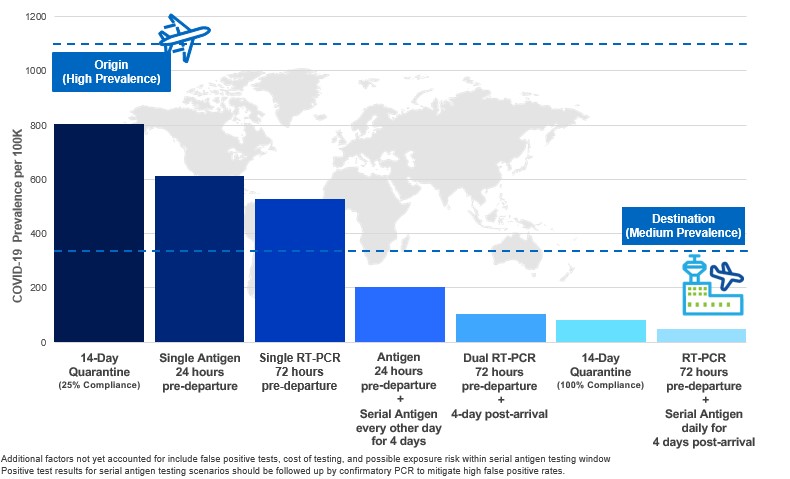IATA studies support pre-travel testing replacing quarantines

Michael Wakabi
Studies by airline industry lobby IATA and the Airbus-Boeing duopoly, show that governments can reopen international travel with minimal risk of introduction of COVID-19 to destination countries, even without quarantine measures. The risk of transmission or serious illness, shrinks further when travelers are vaccinated against the virus.
Speaking ahead of the first in-pandemic face to face G7 Summit that concluded in the UK this weekend, IATA Director General Willie Walsh asked the world leaders to endorse the use of data to safely plan and coordinate the safe resumption of air travel.
“Data can and should drive policies on restarting global travel that manage COVID-19 risks to protect populations, revive livelihoods and boost economies. We now have more than a year of global data that can help governments make more targeted decisions on international travel. This can keep the risk of importing COVID-19 cases low; including variants of concern, while restarting international travel with minimal infringement on the ability to live normal work and social lives,” Walsh said.
IATA’s call follows joint studies with Airbus and Boeing that sought to demonstrate possible methods for managing the risk of COVID-19 transmission as efforts to restart global air travel falter. According to data from tests conducted on 366,000 arriving passengers in the UK between February and May this year, who were PCR negative before travel, only 2.2pc tested positive for COVID-19 infection during quarantine after arrival. More than half of positive cases were from “red list” or very high-risk countries. If that category is removed from the statistics, the test positivity rate would drop to 1.46percent.
Samples taken from 103,473 arrivals from the EU excluding Ireland, returned a positivity rate of 1.35 pc with just three countries – Bulgaria, Poland and Romania – accounting for nearly two thirds of the positive cases.
“Many governments continue to require universal quarantine—either hotel-managed or self-managed. This impedes the freedom of movement, discourages international travel and destroys employment in the travel and tourism sector. Data from the UK tells us that we can and must do better,” Walsh says Adding that almost 98pc of those detained in quarantine negative for the virus.
In its study which focused on risks across the whole journey, Airbus used more than 50 variables including the number of confirmed cases and fatalities per country, COVID-19 testing strategies, traffic statistics, flight length, time spent in airport terminals and provision of on-board catering and air conditioning. Using data from multiple sources including the US CDC and the World Health Organization, Airbus cross referenced its model against data from actual results and observations from travel to arrive at three risk scenarios.
Computations showed a high to medium risk for travel from Latin America and the Caribbean which has an incidence of 292 cases per 100,000 people; to Canada whose incidence was 95 cases per 100,000 people.
“Assuming the same traffic as in 2019 and without any testing, we expect that the local incidence in Canada would increase by just over 1 case / 100,000 population due to the imported cases over 14 days. With a single PCR test before travel, this number falls to less than 1 case/100,000 population,” Airbus says in its findings.
In simulations of the risk from a high incidence region such as Europe (111 cases /100,000 population) to Singapore (8 cases/100,000 population), basing on the same traffic as in 2019, Airbus predicts only one imported case through air travel among every 100,000 people, without any testing, over a 14-day period. That number would fall to less than one if passengers took a PCR test before travel.
The Boeing study demonstrated that screening protocols offer an effective alternative to mandatory quarantines for many travel scenarios. Data showed that screening protocols lower the risk to the destination country and are most beneficial for travel from higher to lower prevalence areas. The passenger screening model and findings were validated using actual travel testing data from Iceland and Canada. Boeing is now modeling scenarios with vaccinated travelers.
IATA is also using the findings to advocate against the possibility of governments making full Covid-19 vaccination a precondition for travel. Walsh says preventing unvaccinated people from traveling “would create an unacceptable exclusion. Data from the UK NHS regarding international travelers arriving in the UK (with no reference to vaccination status) shows that the vast majority of travelers pose no risk for the introduction of COVID-19 cases after arrival.”
“There is no one-size-fits-all solution to manage the various levels of risk. The economic and social cost of the blanket measures taken by most governments to date has been unnecessarily high. With this modeling, we are demonstrating that we can be smart with calibrated travel policies that address the risks, enable travel, and protect people. Everybody can respect a data-driven decision. That is the way back to normality,” said Walsh.

 African Heads of state head to South Korea next week for Summit talks
African Heads of state head to South Korea next week for Summit talks
 Trading leads as main source of income for Ugandans
Trading leads as main source of income for Ugandans
 New leadership for bankers’ umbrella as total assets top $12 billion
New leadership for bankers’ umbrella as total assets top $12 billion
 Brussels Airlines to announce Nairobi service
Brussels Airlines to announce Nairobi service
 SITA promises enhanced travel experience after Materna acquisition
SITA promises enhanced travel experience after Materna acquisition
 Saudia’s 105 aircraft order stretches A320neo lead over rival Max
Saudia’s 105 aircraft order stretches A320neo lead over rival Max
